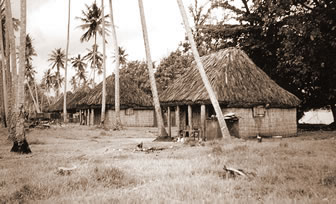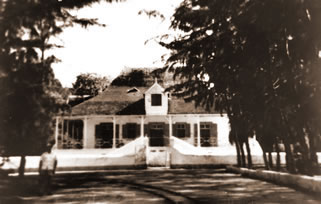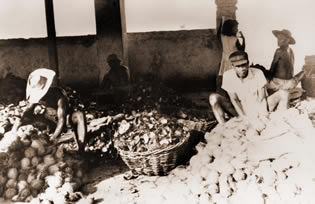A few months
ago, I was putting better quality photos
from Kirby Crawford on the First Americans page,
and I read again of an audio recording he
had made of a Sega Party while he was on DG
in 68 - 69. So I wrote and ask if I
could get a copy.
Sega? What's Sega?
Well, its a sort of interchangeable
word. For one, it refers to a Dance,
basically at night around a campfire, and is
in that sense a tribal-type event.
Sega Dances are known by various and similar
names on the Southeast Coast of Africa, and
in the various island groups in the Western
Indian Ocean. Sega also refers to the
strong white-lightening liquor made of
fermented coconut juice, which the workers
secretly brewed. Of course this would have
been against the law, and certainly would
have been the subject of investigation by
the BIOT Police, had there been any BIOT
Police in those days! Since their
reincarnation in the 1970's, the BIOT Police
have dutifully gone after moonshiners (they
certainly were when I was there in
1988). Probably still are - don't want
to cut into the profits at the Club!
What's a Sega Party?
It appears to have been the equivalent of
the toga party in Animal House, with the
partiers providing the entertainment, the
Sega liquor, and dancing the Sega Dance late
into the night. Here's how Captain
Thompson described a Sega Party he secretly
witnessed from the surrounding jungle in
1942, after bribing his way to the area with
some bottles of whiskey:
As if
automatons awakened, the scene
gradually stirred into life, the
toys moved stiffly in the shadows. .
. The drums grew louder, quicker,
the beat deepening to a wild urgency
. . . slowly the rhythm and movement
increased; the dancers bodies
glistened and shone in the heat . .
.couples paired and danced together
. . . They danced, drumming now a
drug, the blood of the living
moment, burrowing into muscle and
brain, throbbing in the body like an
iron pulse, alive, dynamic."
The
clearly African and tribal roots of the Sega
Party were often judged too intense,
especially sexually, by the European
overlords, and these parties were supposedly
outlawed by the Plantation Managers and
governors from time to time. Today,
they would say they were "prejudical to good
order and discipline"! The party
basically consided of drum beating, singing,
drinking lots of Sega, and "The Dance",
which was held around a fire on a beach or
in a clearing. An observer in the
1930s reported the drinking and singing went
on for hours and became "increasingly
frenzied and reportedly often ended in
fornication" [quoted by Richard Edis, Peak
of Limuria, page 60].
The Ilois were very attached to
the dance. Small wonder. There
were no concert halls, singles bars, or even
penny arcades in the Chagos in those
days! Besides being a cultural affair,
it certainly was the most fun to be had,
especially if there was fornication
involved... kind of the way keggers are for
stateside college students. According
to Edis, "an attempt by a manager in the
Salomons to ban Sega in 1937 led to an
insurrection"! Lead by future-Senator
Blutarski no doubt.
During Kirby's year (68 - 69) on
the island, he says "they popped up here and
there on Saturday nights." One Saturday
night Kirby and the boys were invited to
one, along with Reginald Payete, the
plantation manager, and by all reports, it
was wild. The music consisted of
fantastic singing by a woman with an
intoxicating voice, and the band consisted
of men beating on four 55-gallon drums with
rocks. The songs themselves were
stories in the "Creole" French of the
Seychelles and Mauritius, and were about
daily life, folk lore and many other
things. And Kirby managed to record
about 45 minutes of the singing!
In 2006, Pat
Mayot, a linguistics expert in the
Seychelles, listened to the tape and said,
"It was a very exciting moment inserting it
into my cassette player and pressing the
'play' button! Talk of a 'blast from the
past'. . . At least one of the women who
speaks has got an accent which sounds more
Mauritian than Seychellois, whereas another
sounds more Seychellois. . . Reginald Payet
(who I've been told by one person passed
away two years ago - but I'll check again to
be sure) sounds either 'tipsy' or tense. .
. I say that because in his 'speech'
he refers (very obliquely) to male junior
staff who had been behaving in a manner that
he judged insubordinate. His own Creole
contains a lot of French - I'm not sure
whether he spoke like that all the time or
whether he felt he had to 'sound right'
because he was being recorded. . . In one of
the songs the female singer praises Reginald
Payet as a good man and implies that it is
wrong that some people misbehave towards
him. All this gives some idea of the
'dynamics' of the place!"
Most
importantly, Mr. Mayot states:
"I
don't know if any other similar
recording from the Chagos exists -
your material is probably unique!"

Here's Kirby's short
narrative regarding this unique historic
and cultural recording:
"On
Saturday evening, May 31 in 1969, we learned
that there was to be a 'Sega' party over at
the plantation at East Point. We had been
told that at one time these party’s had been
prohibited on the island because they tended
to get out of hand with excessive drinking
and other activities.
"My
thought was that this would be something
interesting to see and perhaps an
interesting activity to record. So Gus Jones
and I carried my Akai reel-to-reel tape
recorder over to the plantation and set up
two stereo microphones in front of one of
the huts just north of the jetty near the
edge of the lagoon.
"A good
number of the plantation workers had
assembled and they were in a festive mood.
In the early evening the music and the
drinking of local home-brew spirits
started out slowly but as the sun was
setting, the music got louder and the
drinking got heavier.
"The
only musical instruments were 55 gallon
drums beaten with rocks. At one point the
plantation manager, Reginald Payette stepped
before one the microphones and made a short
speech in the French/Creole language.
"The
party went on throughout the night and in
the early hours of the next morning some
interesting romantic activities were
reported to have been seen." hmmmmm...
maybe Edis was right...
The
PPDRDG Ministry of Propaganda asked Kirby,
"Did you ever think when you were there how
simply taking pictures and recordings of
things that interested you at the time would
turn out to be priceless historically?"
He
answered, "When I was taking pictures on
Diego, I really didn't have a sense of any
future historic value as far as recording
the local culture etc. Most of my
photos were taken to be sent back to our
office in Washington so the bosses could
have show & tell material concerning our
satellite tracking operations. In
retrospect, I wish I would have taken a lot
more photos of the people and activities on
the island. However, when I decided to
record a sega party, I did have a sense that
this was an opportunity to record something
very unique that would some day disappear.
Little was I to know that it would
dissappear so soon."
On October 15, 1971, the MV
NORDVAER got underway from Diego
Garcia, carrying the last of the
plantation workers and their families
to exile (or evacuation, depending on
how you look at it), ending 178 years
of
slavery,
contracted
labor,
continuous
civilian
habitation,
and
Sega Parties.
 |
|
P.S. Here is a better rendition
of some of the Sega songs.
PA PLORER – CREOLE LYRICS
Pa plorer, pa sagrin marmail, na pa
sagrin le roi George VI finn envoy so zom vey nu.
Mo le cozer, mo le cozer mo pa kapav, mo le cozer mo
per tensyon mo gagn enn mari pa larguer
Lundi bo-matin mo tan lisyen kriye, ki li kriye, guet
avion la ape fer letur Rafael
Pa plorer, pa sagrin zenfans, na pa sagrin le roi
George 6 finn envoy so zom vey nu.
La lahe le le, lehe lehe le le ela la
la la la la la…
Lundi bo-matin mo tan lisyen kriye, ki
li kriye, guet avion la ape fer letur Rafael
Pa plorer, pa sagrin zenfans, na pa sagrin le roi
George 6 fine envoy so zom vey nu.
(Male voice singing: ‘ki li pe roder,
ki li pe roder avion la? Li ape fer letur Rafael.’)
Ki li pe roder, ki li pe roder avion
la, ki li pe roder, le roi George 6 finn avoy so zom
vey nu.
Lundi bo-matin mo tan lisyen kriye, ki li kriye, guet
avion la ape fer letur Rafael
Mo le cozer, mo le cozer mo pa kapav, mo le cozer mo
per tensyon mo gagn enn mari pa larguer
Mo ti le cozer, mo ti le cozer azordi, mo ti le cozer
mo per tensyon mo gagn enn mari pa larguer.
Ti le le le la la la, ti le le le la la
la
Don mwa la main, don mwa la main charli
oh, don mwa la main charli o pas laisse amene la mort
lor Diego.
(Male voice: ‘Don mwa la mort Charli,
pa laisse nu mort dan Diego’)
PA PLORER – ‘DON’T CRY’ – ENGLISH
TRANSLATION
Don’t cry, don’t be sad little ones,
don’t be sad King George VI has sent his men to look
after us.
I’d like to talk, I’d like to talk but I can’t, I’d
like to talk but I fear in case I get into trouble.
Monday morning I heard the dogs barking, what are they
barking for, look at the planes flying over Raphael.
Don’t cry, don’t be sad children, don’t be sad, King
George VI has sent his men to look after us.
La lahe le le, lehe lehe le le ela la
la la la la la…
Monday morning I heard the dogs
barking, what are they barking for, look at the planes
flying over Raphael.
(male voice: ‘what is it looking for, what is it
looking for this plane, it is flying over Raphael’)
What it’s looking, what it’s looking for that
plane, King George VI has sent his men to look after
us.
Monday morning I heard the dogs barking, what are they
barking for, look at the planes flying over Raphael.
I’d like to talk, I’d like to talk but
I can’t, I’d like to talk but I fear in case I get
into trouble.
I’d like to talk, I’d like to talk today, I’d like to
talk but I fear in case I get into trouble.
Ti le le le la la la, ti le le le la
la la
Give me a hand, give me a hand oh
Charlie, give me a hand Charlie, don’t let death
come on Diego.
(male voice: ‘Kill me Charlie, don’t let us die on
Diego.’)
THE
ADMINISTRATOR’s SPEECH
On the tape recorded by Kirby is the
following speech by the local manager of the copra
workers. His jovial exhortation that all at the
gathering should enjoy themselves is punctated by a
verbal attack on a group present whom, he
suggests, have attempted to question his authority.
The speech is incoherent in parts, probably as a
result of the quantity of alcohol imbibed by the
speaker!
CREOLE
TRANSCRIPTION
Nu pa vinn la zis pou tap tanbur, pu
ceci pu cela. Alor nu tu nu’ne vinn la pu amizer,
pu fer ninport ki sen’la amizer, pa vre, ki foder
dimoun pu fer kamarad amizer, saken a son tur,
n’est-ce pas ? Nu pa bizin dimoun pu vini pu di
sa li ceci sa li cela. Alor nu byen kontan zot inn
vini, sirtu sa ban gogo*, sa ban gogo* ki zot krwar ki
zot kapav bat l’administrateur, mo byen kontan mwa, sa
ban boug ki di sa. Mo tuzur silencieux mwa, mo tuzur
doucement. Nu byen kontan ki manyer zot’inn fer
tanto, Ki tu kitsoz ki zot partu
pardonner, pu zot ein… Mersi bucu ein… Don nu ban
zoli sanson… si ena enkor enn ti pe… si ena bwar…
selma li a zoli pu nu ein.
ENGLISH
TRANSLATION
We are not here only to beat the drum,
for this and that… Well, we are all gathered here
to enjoy ourselves and to make sure everybody here has
fun, are we not? We need people to have fun, one and
all, do we not? We do not need people to come to say
this and that. Well, we are very happy you have come,
especially those bastards, those bastards who believe
they can beat up the administrator. I am happy, I am,
that these men say this. I am always quiet, I am
always slow. We are happy the way you have behaved
this evening. That you have forgiven all. Thank
you. Give us some beautiful sega songs…we have
drinks… well, it is very good for us, isn’t it?!!
SEGA SONG: “Missié Payet”
The following song about the
administrator, Mr Payet, is particularly interesting
because it indicates how the workers on Diego Garcia
made up their own lyrics to describe incidents in
their lives, and their feelings about them. A literal
transcription is given below, followed by an English
translation. The song appears to praise Payet’s
intervention in sorting out domestic disputes among
the workers as well as relating to an incident which
seems to involve a fishing trip to one of the shoals
that may have been dangerous [not all of the words can
be clearly interpreted]. This song, describing as it
does, the daily tribulations of the labourers on
Chagos, provides an insight into the mindset of the
workers, although it must be borne in mind that the
song was sung in the presence of the
administrator, presumably as a tribute to him,
and may not be an entirely accurate reflection of
attitudes towards him. If any residents of Diego
Garcia who listen to Kirby’s recording can help to
identify ‘M Greller’ and ‘beautiful Adele’, or have
any anecdotes of their own, we hope they will add
their comments below.
‘Missié Payet’ – CREOLE
TRANSCRIPTION
Missié Payet li enn bon regisser,
manyer ki nu’a pe fer, mo krwar nu pu fer li move.
Missié Payet pran pesser posson lor banc, la manyer nu
pe aler mw’asirer nu pu perdi nu la vi.
U le kozer, mo le kozer, kot mo la caz mo ti le
kozer mo pena rezon pu mwa kozer.
Si mwa kozer mwa pe travail kot mo burzoi, mwa pe
travail kot mo burzoi, l’inn met la pe kot mo la caz.
Missié Payet li’enn bon regisser, la
manyer ki nu pe fer nu mem ki pu fer li move.
Mo byen fupamal, letan mo kot sega mo pa kone ki pe
passer kot mo la caz, mwa inosan pa kon nanye.
Ou le kozer, mwa galoup kot mo regisser, mo regisser
vinn met la pe, vinn guetter kot mo la caz.
Zozo mo mari y’a inpe gro leker, nou met kuraz kot nu
la caz, nu pa le sa gogoterie.
Mo byen fupamal zot araze zot p’araze mw’asi mo parey
kuma zot. Di tou din tou di.
Ti le lehe le lehe, le lehe le lehe
le le lehe.
Don mwa la me mo’nn pare, don mwa la
me, la manyer ki nu pe fer nu sire nu pu perdi nu la
vi.
Rod mari, mari mwa pe rod li, mo pe rod mari li pa ti
la, mari dan la caz missié Grellé.
Repone mo la vwa, repone mo la vwa, Adele repone mo la
vwa, Adele ma belle ti pu la vi.
Ti le lehe, le lehe, ti le lehe le
lehe le le lehe… [2nd female voice]: la
la la la la la lala.
Nu’ena enn bon regisser nu pa kone
amene, anu chombo li de de la me, si nu perdi nu
perdi.
Li enn bon regisser, li enn bon regisser, nu mem ki pu
fer li move.
‘Missié
Payet’ – ENGLISH TRANSLATION
Mr. Payet he is a good manager, the way
we are doing things I believe we will make him angry.
Mr. Payet takes fishermen fishing on the bank, the way
we are behaving I can assure you we all going to lose
our lives.
You want to talk, I want to talk, by my home I wanted
to talk but I have no reason to talk.
And if I talk, I am working at my boss’s, I am working
at my boss’s, who has brought peace to my home.
Mr Payet he’s a good manager, the
manner in which we’re behaving we’re going to make him
angry.
I don’t really care, while I am singing sega I don’t
know what’s going on at my place, I’m innocent I know
nothing.
You want to talk, I ran to my manager, my manager came
to bring peace, come to see by my place.
Zozo my husband who’s a little jealous, nevertheless
we take courage at home, for we don’t want any
bullshit.
I don’t really care whether you’re angry or not, I’m
also just like you, what has to be said has been said.
Ti le lehe le lehe, le lehe le lehe
le le lehe.
Give me a hand I’m ready, give me a
hand, the manner in which we’re behaving we surely
will lose our lives.
Looking for my husband, I’m looking for my husband,
I’m looking for my husband he wasn’t here, husband is
in the house of Mr. Greller.
Answer my call, answer my call, Adele answer my call,
beautiful Adele it was for life.
Ti le lehe, le lehe, le lehe le lehe
le le lehe [2nd female voice]: la la la
la la la la lala.
We have a good manager
we don’t know how to keep him, hold him with both
hands, if we lose we’ll lose.
He’s a good manager, he’s a good manager, and we are
the ones who will turn him into a bad manager.
FRENCH SONG: “Auprès de
Toi”
The labourers working on Diego Garcia
in 1969 would all have understood the French-based
creole language spoken – with some variations of
vocabulary and pronounciation on the islands of
Mauritius, Seychelles and Réunion, and imported from
there to the Chagos archipelago. Many of them would
also have been familiar with the French language and
would have heard French songs playing on the radio in
the Mascarenes and Seychelles islands. It is not
surprising, therefore, to find that one of the songs
recorded by Kirby Crawford and sung by the islanders
is not in the creole tongue, but in French.
FRENCH TRANSCRIPTION
Auprès de toi,
Alice ma bien aimée
Me consoler
Tu me consoleras
Eh bien j’ai fait
Pour ta fête en famille
Moi j’ai su faire
Moi j’avais ni père ni mère
Moi j’ai su faire
Moi j’ai ni père ni mère
Auprès de toi
Tu me consoleras
ENGLISH TRANSLATION
By your side
My beloved Alice
To console me
You will console me
Well I did
For your family party
I knew what to do
I had neither father nor mother
I knew what to do
I have neither father nor mother
By your side
You will console me
|





